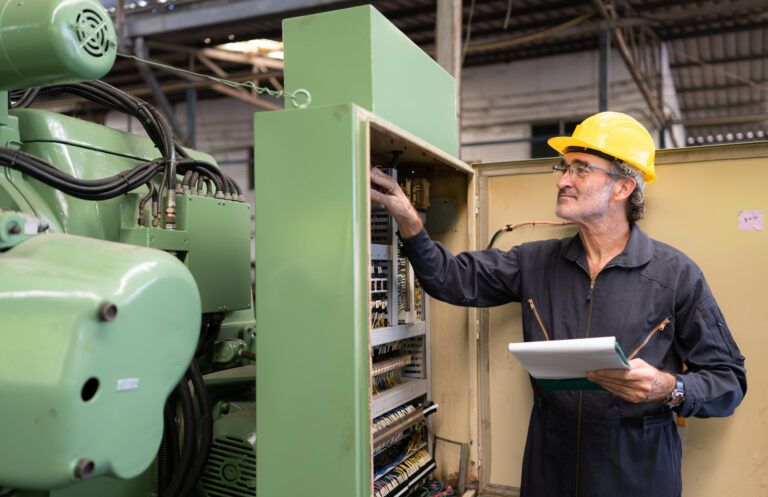In the dynamic world of engineering, the role and demand for electrical engineers have evolved dramatically, mirroring the rapid pace of technological advancements and shifting societal needs. From the foundational industries of manufacturing and utilities to the cutting-edge realms of digital technology, renewable energy, and electric vehicles, electrical engineers find themselves at the heart of innovation. This article delves into the multifaceted job market trends for electrical engineers, exploring how the digital revolution, the push for sustainable energy solutions, and the growth in automation and robotics are reshaping the landscape.
With a spotlight on the skills in demand and the industries leading the hiring surge, we navigate through the opportunities and challenges that lie ahead for these pivotal players in the engineering sector. Whether you’re an aspiring electrical engineer or a seasoned professional, staying on top of industry trends can help you land your next electrical engineering job and power your career forward in an ever-changing world.
How Has Demand for Electrical Engineers Changed?
The demand for electrical engineers has undergone a significant transformation over the years, driven by the relentless pace of technological advancements and a growing reliance on electronic devices and systems across various sectors. Initially, the focus was primarily on traditional industries, including manufacturing, telecommunications, and utilities. However, the landscape has undergone dramatic expansion since then.
One of the pivotal drivers behind this shift is the digital revolution, which has introduced new fields such as information technology, robotics, and the Internet of Things (IoT). These areas demand the specialised skills of electrical engineers to develop and maintain sophisticated electronic infrastructures and systems, thereby broadening the employment prospects for these professionals. Furthermore, the global movement towards sustainable energy solutions has significantly influenced the demand for electrical engineers.
The transition from fossil fuels to renewable energy sources, including solar and wind energy, requires the design and implementation of innovative power systems and grids. Electrical engineers play a crucial role in this process, focusing on the development of efficient, renewable energy technologies and ensuring their seamless integration into existing infrastructure. The automotive industry’s pivot towards electric vehicles (EVs) serves as another testament to the evolving demand for electrical engineers.
Today, electrical engineers stand at the vanguard of innovation across a multitude of industries, from renewable energy to advanced computing, underscoring the critical and expanding role they play in driving the future forward.
Surge in Renewable Energy Projects
The surge in renewable energy projects represents a pivotal shift towards sustainable energy solutions on a global scale. Electrical engineers are in increasingly high demand to spearhead the development and implementation of cutting-edge power systems and grids tailored for renewable sources, such as solar and wind energy. Their expertise is crucial in not only crafting innovative renewable energy technologies but also in seamlessly integrating these systems into existing infrastructures to enhance efficiency and sustainability.
As the world moves to address its energy needs with minimal environmental footprint, the role of electrical engineers in renewable energy projects is becoming ever more critical.
Tech and Electronics Sectors Expansion
Amidst the expansion of the tech and electronics sectors, driven by relentless advancements in technology and a growing consumer demand for electronic devices and systems, electrical engineers find their skills more valuable than ever. From designing microchips and semiconductors to developing sophisticated communication systems and the Internet of Things (IoT), electrical engineers are at the heart of innovation in the tech and electronics industries. Their contributions are essential in pushing technological boundaries, ensuring that the rapid growth and innovation within these sectors continue to thrive.
Automation and Robotics Growth
The growth in automation and robotics mirrors the increasing adoption of automated systems and machines across a wide range of industries, including manufacturing and healthcare. This trend has spurred a corresponding rise in demand for electrical engineers, who play a key role in designing, programming, and maintaining these complex robotic systems. Whether it’s integrating robotics into production lines, developing autonomous vehicles, or creating intelligent systems capable of performing tasks with minimal human oversight, electrical engineers’ expertise in automation and robotics is driving efficiency and productivity across numerous sectors, fundamentally transforming the future of work and daily life.
What Skills Are In Demand for Electrical Engineers?
In the dynamic and ever-evolving landscape of the job market, electrical engineers are expected to master a comprehensive set of skills to stay ahead. These skills are not just requisites for innovation but also key to unlocking diverse opportunities in sectors ranging from renewable energy and consumer electronics to automotive and aerospace, underscoring the multifaceted role of electrical engineers in shaping the future.
Proficiency in Software Tools
Proficiency in software tools is essential for electrical engineers, enabling them to design, simulate, and analyse complex systems efficiently. Mastery of tools such as MATLAB, Simulink, and AutoCAD is indispensable, providing engineers with the capability to generate accurate models and schematics critical for project success.
MATLAB, Simulink, and AutoCAD
MATLAB, Simulink, and AutoCAD are cornerstone software in electrical engineering. MATLAB is ideal for numerical computation and visualisation, Simulink excels in simulation and model-based designs, and AutoCAD is crucial for precise drafting and 3D modelling, making these tools invaluable to engineers.
Knowledge of Renewable Energy Technologies
The global shift towards sustainable practices underscores the importance of understanding renewable energy technologies. Expertise in solar, wind, and hydroelectric systems positions engineers to lead in the creation of innovative, clean energy solutions vital for a sustainable future.
Solar, Wind, and Hydroelectric Systems
Specialisation in solar, wind, and hydroelectric systems equips engineers with the skills to design and implement systems that leverage natural resources for energy production. This knowledge is fundamental in driving the transition from fossil fuels to renewable energy sources.
Expertise in Embedded Systems and IoT
Expertise in embedded systems and IoT is increasingly in demand, spanning various applications from consumer electronics to industrial automation. Proficiency in microcontrollers, sensors, and wireless communication is crucial for engineering smart, interconnected devices that enhance data collection, sharing, and analysis.
Microcontrollers, Sensors, and Wireless Communication
A deep understanding of microcontrollers, sensors, and wireless communication is vital for engineers focused on embedded systems and IoT. This knowledge underpins the development of advanced devices and systems integral to the infrastructure of modern technology, from enhancing home automation to enabling smart city functionalities.
What Industries Are Hiring Electrical Engineers?
Electrical engineers are in high demand across a wide range of industries, showcasing the versatility and necessity of their skills in today’s technology-centric world. Each of these sectors presents unique challenges and opportunities for electrical engineers, highlighting their critical contribution to innovation and development across various dimensions of society and the economy.
Renewable Energy
The renewable energy sector is at the cutting edge of environmental innovation, engaging electrical engineers to pioneer and deploy systems that utilise solar, wind, and hydroelectric power, underscoring a global commitment to sustainable energy sources.
Solar Power Companies, Wind Farm Developers
Solar power companies and wind farm developers are in pursuit of electrical engineers to design and refine technologies that efficiently transform natural elements into renewable energy, playing a pivotal role in the green energy revolution.
Consumer Electronics
The consumer electronics industry continues to be a significant employer of electrical engineers, who are tasked with pushing the boundaries of technology in developing the latest smartphones, home appliances, and personal gadgets that are central to contemporary lifestyles.
Smartphone Manufacturers, Home Appliance Companies
Smartphone manufacturers and home appliance companies depend on the ingenuity of electrical engineers to enhance product features, energy efficiency, and user connectivity, driving advancements in household and personal technology.
Automotive and Transportation
The automotive and transportation industry is experiencing a paradigm shift towards electric vehicles and enhanced public transit systems, fueled by the expertise of electrical engineers in creating more sustainable and efficient transportation solutions.
Electric Vehicle Makers, Public Transit Systems
Electric vehicle makers and public transit systems are on the lookout for electrical engineers to integrate innovative technologies that boost vehicle performance, safety, and eco-friendliness, marking a new era in transportation.
Aerospace and Defence
In the aerospace and defence sector, electrical engineers are crucial for the development of advanced aircraft and space exploration technologies, contributing to national security and expanding human understanding of the universe.
Aircraft Manufacturers, Space Agencies
Aircraft manufacturers and space agencies employ electrical engineers to conceive, test, and implement sophisticated systems that ensure the operational integrity, safety, and success of aerospace missions, highlighting the strategic significance of their contributions.
How Do Locations Affect Job Prospects?
The influence of geographical location on the career opportunities available to electrical engineers is profound, with certain areas offering a wealth of opportunities that align with specific industries and technological advancements. The choice of location, therefore, is crucial in shaping an electrical engineer’s career path, influencing both the specialisation areas and the scope of job opportunities available, making geographical location a key factor in career development within the field of electrical engineering.
High Demand in Tech Hubs
High demand in tech hubs such as Silicon Valley, Boston, and Bangalore underscores the vibrant ecosystem of technology companies and startups in these regions. Electrical engineers are highly sought after for their ability to contribute to innovation and technological advancements.
Silicon Valley, Boston, and Bangalore are renowned for being at the forefront of technological innovation. These cities offer electrical engineers unparalleled opportunities to work on pioneering projects and technologies.
Opportunities in Manufacturing Regions
Opportunities in manufacturing regions like the Midwest USA, Guangdong China, and Stuttgart Germany, highlight the importance of electrical engineers in traditional and emerging manufacturing sectors, including automotive and electronics.
The Midwest in the United States, Guangdong in China, and Stuttgart in Germany represent key manufacturing hubs globally. They provide electrical engineers with the chance to engage in critical aspects of manufacturing, from design to production, in industries vital to the global economy.
Growth in Emerging Markets
Growth in emerging markets such as India, Brazil, and South Africa is opening new avenues for electrical engineers. The expansion in technology and renewable energy sectors in these countries is creating a burgeoning demand for skilled engineering professionals.
India, Brazil, and South Africa are experiencing significant growth in their technology and renewable energy sectors. This expansion is generating a wide array of job opportunities for electrical engineers, ranging from sustainable energy solutions to the development of advanced technological infrastructures.
What are Future Job Market Trends?
The future job market for electrical engineers is poised at the intersection of sustainability, technological breakthroughs, and healthcare innovation. These evolving trends underscore a dynamic and promising landscape for electrical engineers, highlighting their indispensable role in driving forward some of the most significant and transformative developments of the coming years.
Focus on Sustainability and Green Tech
The focus on sustainability and green tech is increasingly pivotal, steering electrical engineers towards projects like biofuel systems and carbon capture technology. This movement underscores a global drive towards eco-friendly innovations and the reduction of environmental impacts.
Biofuel Systems, Carbon Capture Technology
Biofuel systems and carbon capture technology stand out as critical areas where electrical engineers can make a significant impact. These technologies are essential for advancing renewable energy solutions and combating climate change, marking a key direction for future engineering projects.
Rising Demand in Healthcare Technology
The rising demand for healthcare technology signals a growing opportunity for electrical engineers in the realm of medical devices and wearable health monitors. This trend is fueled by technological progress and a shift towards more personalised and accessible healthcare solutions.
Medical Devices, Wearable Health Monitors
Medical devices and wearable health monitors are revolutionising patient care, providing electrical engineers with the opportunity to play a vital role in developing technologies that enhance health monitoring and improve patient outcomes.
Expansion of Space Exploration
The expansion of space exploration presents unprecedented opportunities for electrical engineers, with satellite technology and Mars missions setting the stage for innovative research and discovery beyond our planet.
Satellite Technology, Mars Missions
Satellite technology and Mars missions are key areas where electrical engineers can contribute to the cutting-edge of space exploration. These projects not only push the limits of human knowledge but also offer unique challenges and rewards in the engineering field.
Engineering Tomorrow’s Possibilities Today
As the demand for electrical engineers spans industries from green energy and smart tech to aerospace and healthcare, the job market continues to evolve at a thrilling pace. This article has mapped the skills, sectors, and global hotspots shaping the profession, offering a glimpse into how today’s engineers can lead the charge in innovation, sustainability, and connectivity.
Vista Projects is proud to stand at the forefront of this transformation. With decades of experience delivering integrated engineeringThe process of integrated engineering involves multiple engineering disciplines working in conjunction with other project disciplines to e... solutions, we empower electrical engineers to thrive on complex, high-impact projects across energy and industrial sectors.
Ready to plug into the future of engineering? Connect with Vista Projects and power your career on projects that define what’s next.









